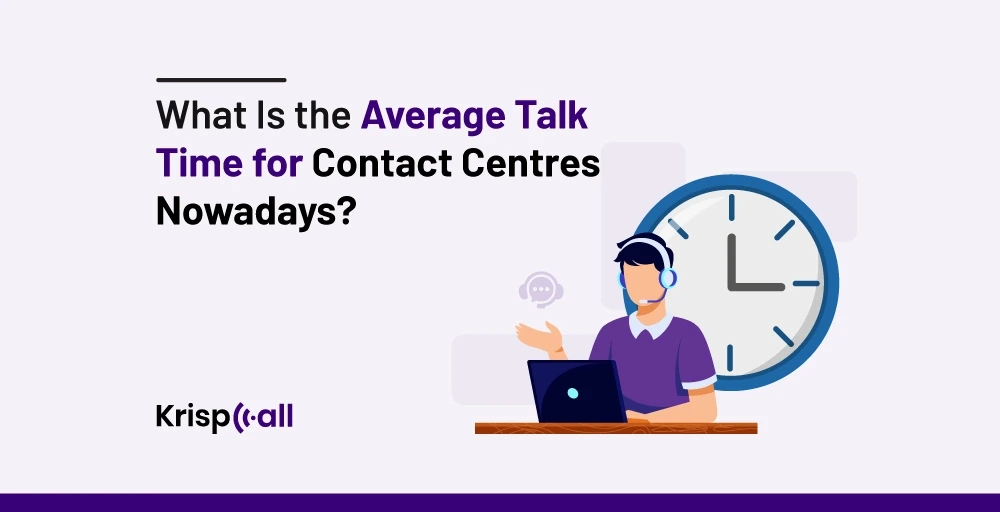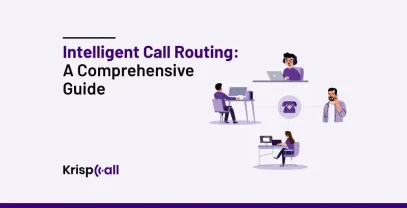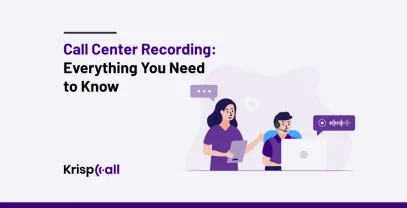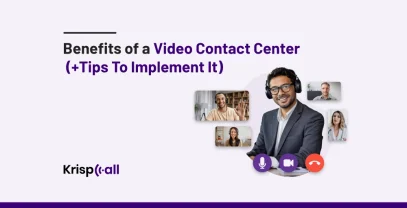In today’s digital age, where self-service options and AI chatbots are becoming more prevalent, customers might anticipate shorter conversations when they contact a contact center. But how do you figure out how long the average customer spends on a call with a contact center agent?
One important metric that helps call centers track call duration is Average Talk Time (ATT).
Average talk time measures the duration of time that the agent spends interacting with the customer.
In this blog, you will go through the average talk time for contact centers, their components, their importance, and some of the factors influencing them.
🔑Key Highlights
- Average Talk Time (ATT) is the duration of time that the agent spends interacting with the customer time required to complete one conversation or call.
- The formula to calculate ATT is (Total Handling Time – Total Hold Time – Total Wrap-up Time) Number of Calls Handled.
- The components of average talk time consist of talk time, hold time, and after-call work time.
- It provides valuable insights into customer satisfaction and operational efficiency.
- Several factors, including the nature of the customer inquiries, complexity of issues, and types of service provided, affect the average talk time.
What is the Average Talk Time for Contact Centers?
The Average Talk Time for Contact Centers is the time required to complete one conversation or call. It is the average duration that agents spend with a customer, from answering the call to its conclusion, including hold time, talk time, and post-call wrap-up activities. ATT for contact centers typically ranges between 4 and 6 minutes per call.
In a contact center, ATT is calculated to know how quickly representatives can solve problems or respond to customer inquiries. This helps assess the effectiveness of communication in customer service experiences and telemarketing. It can vary based on factors such as the industry, the complexity of customer inquiries, and the type of service provided.
The formula used to calculate Average Talk Time is :
ATT = (Total Handling Time−Total Hold Time−Total Wrap-Up Time) / Number of Calls Handled
What are the components of average talk time for contact centers?
The average talk time for the contact center consists of several components, including:
1. Talk time
Total talk time is the total time the agents talk with customers during an interaction. It is measured by Automatic Call Distributor (ACD). This metric is useful when it’s calculated on average. It identifies the proportion of time an agent spends truly speaking during a call.
This metric is important since it indicates how effectively the agents transmit information and respond to customer concerns.
2. Hold time
Hold Time, on the other hand, is a component that deals with the amount of time customers spend waiting on hold for a contact center. Hold time doesn’t include active conversation time, which is an integral factor in measuring customer experience or operation efficiency within a contact center.
It has two main effects: measuring customer satisfaction and the state of operations. It highlights the need for efficient call handling time and minimizing wait times to enhance service quality.
3. After-call work (ACW) / Total wrap-up time
After-call work (ACW) involves the time taken by the customer representatives to complete tasks related to a customer interaction after the call has ended. These may include updating records or scheduling follow-ups in the contact center. ACW must be well managed to improve the level of customer satisfaction and maximize the use of contact center resources.
4. Number of calls handled
The number of calls handled is the total count of calls managed by a contact center within a specified period, including both answered and unanswered calls.
What is the importance of Average Talk Time in the contact centers?
Average Talk Time is important to determine the efficiency maintained while having a conversation with the customers in the contact center. Effective analysis of the talk time offers several benefits for the call centers;
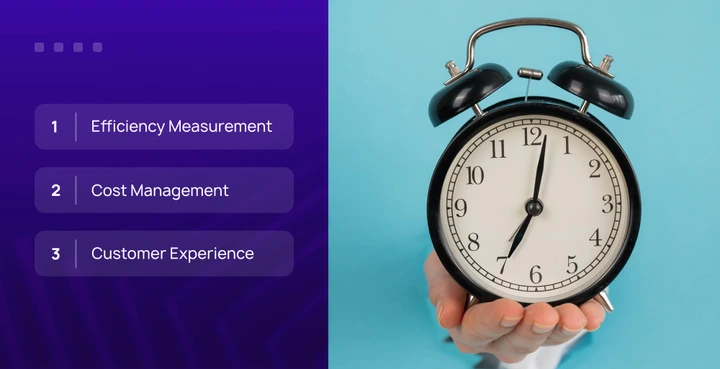
1. Efficiency measurement
Average talk time in contact centers acts as an efficiency indicator. It helps in determining how quickly and effectively agents manage customer calls. While measuring efficiency, lower ATT indicates that agents can resolve issues promptly.
Moreover, it enables managers to identify areas where agents may need additional training or support. The additional training helps agents to perform better in the field where they are performing poorly.
2. Cost management
Longer talk times can increase operational costs, including agent salaries, equipment usage, and infrastructure expenses. By reducing the duration of each call through efficient communication and problem resolution, the call centers can lower agent salaries, decrease equipment usage, and minimise infrastructure expenses. This optimization saves operation costs and ensures that resources are utilised effectively.
3. Enhance customer experience
Call length plays a vital role in enhancing customer experience within the contact center. When ATT is managed effectively, customers spend less time waiting on hold and receive quicker service.
However, if calls are too short, it might mean that problems are not fully addressed, leading to repeat calls and frustration. Striking a balance with ATT ensures that customers feel valued and receive the support they need in a timely manner, ultimately enhancing their overall experience.
🧾You may also like to read : Choosing the right partner for your call center
Factors influencing average talk time for contact center
There are several factors influencing the average talk time for contact centers. These include:
1. Nature of customer inquiries
The types of customer calls that an organization receives also determine the average talk time. Common inquiries, like asking for an account balance, are shorter in nature. However, issues that are not easy to explain, such as technical support and billing inquiries, need longer calls.
The more complex the query, the longer it takes an agent to resolve the issue effectively. Knowledge about the types of inquiries helps contact centers manage and maximize their average talk time.
2. Complexity of issues
The nature of the issues has an immense impact on the average talk time in the contact center. Routine issues such as password resets are handled in minutes, resulting in shorter conversations. These issues can be well addressed in shorter conversations, but longer conversations are needed to address more technical issues.
The more complicated the situation, the longer an agent is required to deal with an issue. Therefore, complicated and lengthy calls need to be effectively managed to keep the average talk time under control.
3. Type of service provided (e.g., technical support vs. billing inquiries)
The kind of service offered in contact centers influences the average length of a call. Technical support calls are sometimes longer because they need to find the cause of a problem and describe it in detail. On the other hand, giving balance details is normally quicker than billing as they may only require a check of balances or an explanation of charges.
The length of a call depends on the nature of the service: some require more time per call than others. These differences enable contact centers to manage call-handling time and effectively utilize resources.
4. Agent experience and training
Average talk time in contact centers is often determined by the kind of training and experience of the agents. Professional and knowledgeable agents can deal with the calls quicker and solve more problems in the least time. They know how to fast-track through systems, ask the right questions, and deliver meaningful solutions.
Lack of experience could also mean that new agents would take longer to complete calls than experienced agents. All agents should be trained regularly and continually practice to increase efficiency and minimize the average talk time.
5. Contact center technology
Agent talk time is also affected by the technology used in your contact center. Complex solutions provide agents with quick access to customer information and potential problem resolutions. Automated responses, Customer Relationship Management (CRM), and knowledge bases make things faster and reduce the time spent on each call.
It is also possible that if the technology is outdated or not very user-friendly, the agents will take longer to find the required information. Implementing good technology enables efficiency and reduces average talk time.
6. Customer behaviour
Average talk time in the contact center also depends on customers’ behavior. Some customers may be straight to the point, and the content will be short, while others may be talkative, and the call will be long. Moreover, customers who are angry or dissatisfied may further prolong the call by elaborating on their issue.
Learning about various customer behaviours and how to respond to them can assist the agent in managing his talk time and meeting the needs of the customers. In addition, developing effective means to serve various customers can help to achieve the right average talk time.
7. Variability in customer needs and expectations
Average talk time in contact centers is largely dependent on the differences in customer needs and expectations. The length of interaction for different customers can vary depending on their needs and knowledge. Some customers may require detailed descriptions or further help, which means that the calls may be longer while others just need quick solutions.
Identifying and meeting these different needs and expectations is crucial for agents to allocate talk time properly and deliver service accordingly. Moreover, it can help achieve the average talk time with positive customer satisfaction.
Also Read: Average Handle Time: Formula, Calculation, & Improvement Tips
Conclusion
Average talk time (ATT) is a crucial metric in contact centers. It represents the time taken to complete a single conversation or call. By optimizing talk times, businesses can enhance operational efficiency and reduce expenses without compromising service quality.
Similarly, several factors influence customer-agent talk time, such as the nature of customer inquiries, the complexity of issues, and customer behavior. Acknowledging and navigating these factors empower organizations to tailor their strategies adeptly, ensuring they meet customer needs precisely and without delay.
FAQs
What is the average talk time in a call center?
The average talk time in a call center is the average duration an agent takes to end a conversation with a customer over the phone. Typically, the average talk time in the call center is 4-6 minutes per call. However, this time may vary depending on the industry, the nature of the problems under consideration, and the expertise of the technical support and customer service teams.
What is the average talk time for customer service?
The average talk time for customer service is around 4 to 6 minutes per call. However, this may depend on the nature of the issues that are being resolved, as well as the nature of the industry in which the customer service is being offered.

